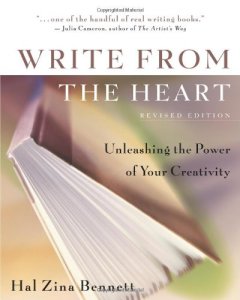By Hal Zina Bennett. 1995. Revised edition 2001.
Chapter 1: Born to Write
…most of the skills required by this craft are commonplace. And the magic ingredient so many of us writers seek–that which will allow us to turn our dreams of becoming successful writers into the real thing–is always right under our noses. For example, much of that ingredient starts with solitude, with the experience of sitting quietly until we are welcomed into our own inner worlds.
As simple as that sounds, it’s also something that we trade for the lesser pleasures of modern life, like Walkman radios people wear on their heads even of hiking trails in the wilderness.
When I sat down to write this book, I knew that the central message I had to convey to other writers was that the most valuable asset we have in this vocation is ourselves. Even the best writers seem to require constant reminders of that. There are a million books out there that teach writing techniques, things like how to create characters, how to develop a focused theme, how to write dialogue, or how to organize your book.
Where do I look for the imagery and themes that I can feel truly passionate about? Where do I find ideas so thoroughly engaging that the sheer momentum of my fascination will propel me forward to fill the two or three hundred pages it takes to make a book? How can I truly make a contribution through my writing? What is my gift and my mission?
“There is nothing new under the sun–except you.”
…each of us who dares to reach in and pull out what is truly ourselves brings a new way of seeing into the world.
That spark of recognition and connectedness that we experience when we’re really on isn’t really an illusion. And the drive we feel to write something really stunning and glorious isn’t self-indulgent. Rather, what excites us is the recognition that our writing literally builds bridges between our consciousness–our life experiences–and that of at least one other person.
How do we tap into and express the joys, sorrows, hopes, and fears that prod our readers to action or move them emotionally?
Chapter 2: Why We Must Write
My approach to writing, I’m afraid, has never been particularly literary. I have an idea this may have started as a reaction to graduating from a college creative writing program, where Literature, with a capital L was elevated to a golden pedestal, high up in the ivory tower. I always had the feeling that we were supposed to worship rather than have our lives transformed by the writings of people like Joseph Conrad, Dostoevsky, and even–yes, they definitely would have said “even”–John Steinbeck, who my teachers considered little more than a journalist with literary pretensions.
There are moments in all our lives so poignant, funny, tender, or perhaps even violent and heartbreaking that communicating them well transports both writer and reader our of their everyday view of the world, expanding their experience of life. Even more than from great literary works, I remember scenes by my students.
When the writer tells it from the soul, even the most gruesome, or embarrassing, or uplifting, or unconscionable, or even puzzling experiences can bring us closer, can remind us of our humaneness and help us more deeply appreciate the gift of life. I tend to agree with Wallace Stevens…when he said that our role as writers is to help people–including ourselves, I would add–live their lives.
If you take your journey as a writer seriously, the end product is going to be much more than a published book, poem, article, or a lifetime of personal journals. the path will take you beyond the surface of everyday life toward the inner space of human experience, where you cannot escape the awareness of creative sources far greater than yourself.
…writing is a spiritual act because it invites us to look beyond the surface of life, to attempt to capture the essence of love, grief, joy, fear, compassion, pride, forgiveness, nobility, wretchedness–in short, the whole gamut of human existence. To write well, we have to open to ourselves and to others. …language by its very nature does this, implying a sharing, an interchange between individuals that breaks through the barriers of our separateness. Why else invest all that energy that goes into learning to speak or write?
Without language we live in relative isolation, cut off from others of our species.
Through the laws of language, we literally dissolve the distance between ourselves. We discover and share with others the uniqueness of our life experiences, and in doing so we discover the spiritual source that bonds us one to another.

